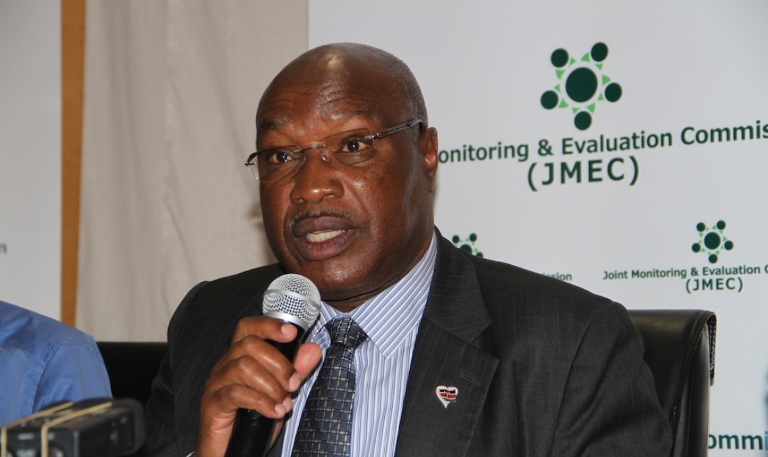S. Sudan peace monitors demand accountability for funds
November 28, 2019 (JUBA) – The interim chairperson of the Reconstituted Joint Monitoring and Evaluation Commission (RJMEC Ambassador Lt. Gen. Augostino Njoroge has called for prudent management and utilization of funds meant for the implementation of the remaining critical pre-transitional tasks of the Agreement on the Resolution of the Conflict in South Sudan (A-RCSS).

He was speaking during the 11th monthly plenary meeting of R-JMEC convened in the country’s capital, Juba on Wednesday.
“I must emphasize that the principles of accountability and transparency in the management of the availed funds is of paramount importance,” said Njoroge.
He also called on the delivery of in-kind donations held up in Juba to their intended cantonment sites without further delay.
“I urge that some funds be used to immediately purchase and deliver food and supplies to cantonment sites to address the unfortunate situation of troops without basic supplies leaving the sites,” he stressed.
Last week, the United Nations Panel of Experts told the Security Council that the South Sudanese government has been unwilling to allocate resources to fully implement the pre-transitional provisions, especially on the security arrangements.
“Despite the pledge made by the Government in May 2019 to disburse $100 million for the peace process, which already represents a significant reduction from an initial budget of $285 million, it has allocated only about $35 million,” the report noted.
Meanwhile, Njoroge said the National Pre-Transitional Committee (NPTC) should immediately release the requisite funds to the implementing mechanisms and set up a follow up mechanism to ensure accountability and transparency.
He also encouraged regular face-to-face meetings of the leadership of the parties to the agreement during the 100 days extended period agreed upon early this month.
On November 7, President Salva Kiir and the country’s opposition leader Riek Machar agreed to delay key benchmarks in the peace agreement by 100 days.
The delay in forming a national unity government on November 12 came after Machar’s group raised concerns that the country’s security arrangements are still incomplete.
South Sudan descended into civil war in mid-December 2013 when President Kiir accused his former deputy Machar of plotting a coup, allegations the latter dismissed.
In September last year, the country’s rival factions signed a revitalized peace deal to end the civil war that killed tens of thousands of people and displaced millions.
(ST)
